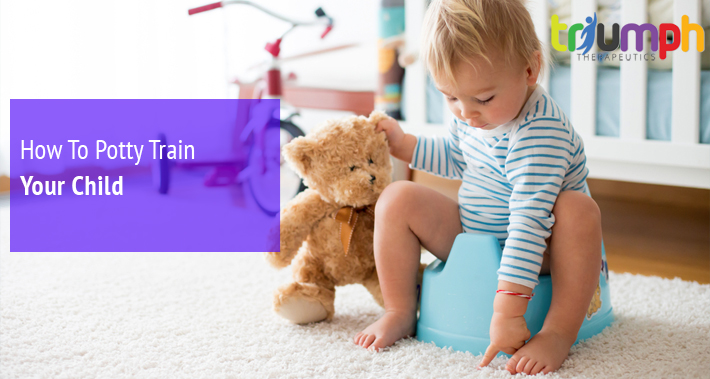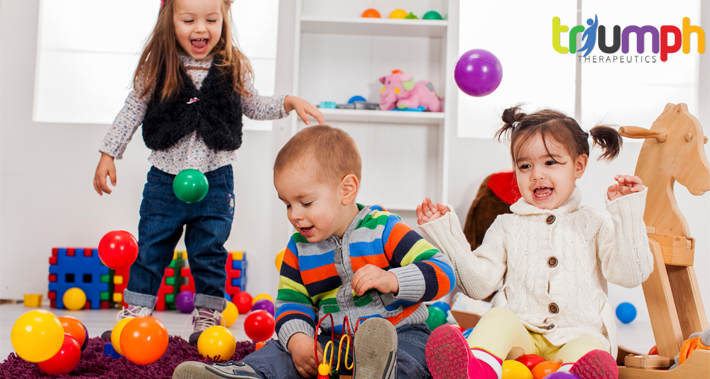How To Potty Train Your Child
https://www.triumphtherapeutics.com/wp-content/uploads/2022/10/Triumph-Therapeutics-Speech-Therapy-OT-Physcial-Therapist-Washington-DC-Oct03-01-2022.jpg 710 379 Triumph Therapeutics Triumph Therapeutics https://www.triumphtherapeutics.com/wp-content/uploads/2022/10/Triumph-Therapeutics-Speech-Therapy-OT-Physcial-Therapist-Washington-DC-Oct03-01-2022.jpgPotty training can be an important milestone for many families.
While some children adapt to this big change easily, children of all ages can face a variety of challenges as they learn to use the toilet independently.
These days, packed schedules, the morning rush, and screen time all compete for your attention and that of your little one.
Toilet training involves new sensations and developmental skills that can be a lot to process all at once.
By building up the underlying skills that make up successful toileting and by taking your cues from your child you can ease the whole family through the process.
Keep reading for our development – focused tips, and if you find you need more direct guidance and support, reach out to us for pediatric occupational therapy treatment services in Washington DC.
Occupational Therapist Potty Training Tips
Potty training calls on everything from spatial awareness to communication to sensory processing.
At each stage of toilet use your child’s brain is processing physical and emotional sensations, new instructions, changes in routine, and so much more.
Taking a skills – focused approach that accounts for the many facets of the experience can help make things less overwhelming for your kiddo and less exhausting for you.
First And Foremost, Be Patient
Every child develops in their own time and at their own pace.
While many kids learn to use the toilet as toddlers or preschoolers, this is not the case for everyone.
Some signs that your child might be ready for potty training:
- They go to a corner or face the wall when they are about to go in their diaper.
- They are curious about the toilet or want to see what you are doing when you use it.
- They can communicate using words or signs that they need to go, or that they have wet or soiled their diaper.
- They have solid, formed bowel movements.
When your child is ready, it may take them some time to get used to the new environment, the sounds and smells, and to put together all the tiny steps and skills involved in using the potty or toilet.
Play activities outside of potty time can help your child develop component skills under less pressure.
Try soaking up coloured water with a kitchen towel to practice wiping, practicing your potty routine with a doll, or singing a song to teach the washing up sequence.
Be mindful of the time your little one spends on the potty – avoid busy times of day, and let them stop after five minutes so that potty time does not feel like a punishment.
Establish A Routine
A consistent routine can help your child feel motivated and confident about using the toilet.
Some ways to integrate routine into potty training:
- Motivate your child by using a sticker chart immediately after potty time.
- Help your child recognize the feeling of needing to use the toilet using physical exercise or specialized foods shortly before potty time.
- Give your child some independence with a visual sequence they can follow.
If your child is having trouble getting into the flow, try writing down the time of day when they soil their diaper for a few days and start your potty routine just before those times when you try again.
Remember, consistency and repetition will help your child learn to recognize signs in their own body and gain confidence with their potty routine.
Understand The Motor Skills Involved In Learning To Potty Train
In addition to cognitive skills, communication skills, and physical development milestones, your child will need to strengthen several motor skills in order to use the toilet independently.
Using the toilet requires balance, coordination, dexterity, grasp strength, mobility, and fine and gross motor skills.
1. Fine Motor Skills
As adults we may take for granted the abilities to turn the tap on and off, tear toilet paper off the roll, and zip and button our pants, all without dropping our phones (at least not too often).
Your child is learning how to complete all these tasks, and will have to rely on still – developing fine motor skills such as:
- Grip and strength for wiping.
- Coordination, pinch, and grip for closing fasteners like buttons, zippers, and snaps.
- Grip, rotation, and pressure for faucets and soap dispensers.
As they become more accustomed to using the potty or toilet, they will also need to learn other motor tasks like flushing the toilet, holding and using towels, and turning doorknobs or opening locks on public restroom doors.
2. Gross Motor Skills
Gross motor skills also play a large role in toilet training.
Your child will need to develop:
- Mobility to get to and from the bathroom.
- Balance and agility to navigate corners and small spaces.
- Climbing to get on and off the toilet and reach the faucet.
- Standing, sitting, squatting, and posture control while using the toilet.
- Weight shifting while reaching for toilet paper and wiping.
Many of these skills can be practiced on stools, scooters, and in high chairs.
What If Your Child Is Having Trouble Potty Training?
There are many reasons a child might not initially take to potty training.
You may choose to speak with your child’s pediatrician to rule out physical or medical issues that could be preventing your child from toileting on their own.
Whatever the reason, an occupational therapist can help you and your child.
An occupational therapist will work with you and your child to identify challenges and provide adaptive equipment, play-based learning activities and emotional management strategies that work.
Children with sensory processing disorder may need time or adaptive techniques to get used to bodily sensations, the noise of toilets and hand dryers, and lighting.
An occupational therapist might recommend changes in clothing or diet to help your child recognize sensations, adaptive equipment like sunglasses, headphones, or essential oils to address certain stimuli, or play-based activity to help your child get used to new textures.
Children with autism spectrum disorder might have the same sensory triggers, feel fearful of things like sitting over the large opening of the toilet, or need additional support to understand bodily sensations and learning sequences.
Occupational therapists can provide visual tools like flash cards and pictures to help your child understand new objects and sequences, stories to support understanding of social context, or sensory play activities to help your child learn and recognize wet, dry, clean, dirty, and other concepts related to potty training.
Book Your Appointment With Triumph Therapeutics Today
Potty training will always be a little messy, but it does not have to be painful.
If you need help identifying what to work on with your child or are looking for new strategies to advance your child’s skills, Triumph Therapeutics is here for you.
To book a consultation or evaluation, or to ask us a question, call, email, or send us a message today.


